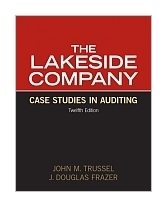|
||
• wydawnictwa polskie
• Zamów informacje o nowościach z wybranego tematu • kontakt
• Cookies na stronie |
LAKESIDE COMPANY CASE STUDIES IN AUDITINGTRUSSEL J. FRAZER D.J.wydawnictwo: PEARSON , rok wydania 2011, wydanie XIIcena netto: The cases in The Lakeside Company are intended to create a realistic view of how an auditor organizes and conducts an audit examination. These cases provide a simulation that permits learners to put the abstract and difficult concepts of auditing into practice. For undergraduate/graduate courses in auditing.
How do you prepare students for the workforce in your auditing class? What types of projects do you assign over the course of the semester that will allow students to get a hands-on look at how an auditor would organize information and solve problems associated with an audit? The cases in The Lakeside Company are intended to create a realistic view of how an auditor organizes and performs an audit examination. These cases provide a simulation that permits students to put the abstract and difficult concepts of auditing into practice. Students have to perform realistic audit activities, such as:
What are some of the characteristics of typical auditing cases that you use in class? Do you prefer a text that is readily adaptable to your needs? This text contains a variety of features intended to provide the utmost flexibility in teaching auditing. Some of the highlights include:
What kind of homework do you assign over the course of the semester? Do you challenge the students with group work and long-term projects? The textbook contains various assignments and research questions that allow students to think analytically outside of class.
168 pages, Paperback
Po otrzymaniu zamówienia poinformujemy, |


